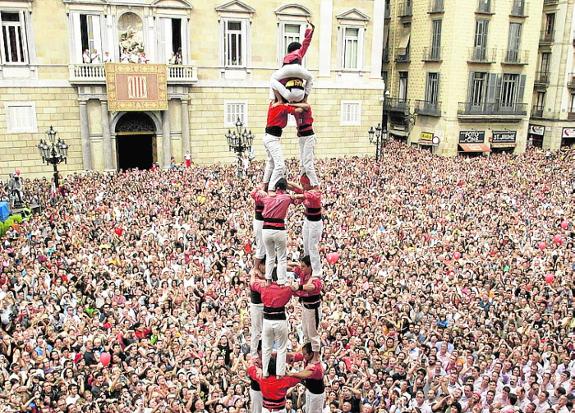

Secciones
Servicios
Destacamos

Debbie Bartlett
Friday, 11 September 2020, 13:58
It is known as La Diada, the National Day of Catalonia, and nowadays it is a day-long festival which is celebrated enthusiastically on 11 September every year, but it has had a very chequered history.
It originated as a commemoration of the defeat of the Catalonian army, who supported the Habsburg dynasty's claim to the throne, by the Bourbon King Felipe V, after the long Siege of Barcelona in 1714, during the Spanish War of Succession. After the city fell, Catalonia lost its laws and institutions and Catalan was no longer recognised as an official language.
The date was first commemorated in 1886, and by 1923 it had become a massive event with floral offerings and activities taking place in different parts of Catalonia, but when there were demonstrations during which police officers and protestors were injured, it was banned by the Primo de Rivera dictatorship.
During the Second Spanish Republic (1931-1939), the celebrations began to be held again and the government of Catalonia, the Generalitat, declared it an official event. However, after Franco won the Civil War in 1939 it was banned once again although some people still celebrated it secretly.
After Franco's death, it was celebrated publicly for the first time again on 11 September 1976, and was followed by a huge demonstration demanding Catalan autonomy in Barcelona on the same date the following year. It was reinstated officially in 1980 by the restored Generalitat de Catalunya, and was one of the first laws to be approved.
Nowadays, Catalonian nationalist organisations, political parties and institutions place wreaths in memory of those who lost their lives leading the defence of Barcelona in the 18th century, and there are concerts and other cultural events, many of them organised by museums. Anyone who has the opportunity to visit Catalonia at this time can expect to see a vast number of flags, flowers everywhere and demonstrations of traditional traditions including the famous 'Gegants' (giants) and 'Castellers' (human towers).
Publicidad
Publicidad
Publicidad
Publicidad
Esta funcionalidad es exclusiva para registrados.
Reporta un error en esta noticia

Debido a un error no hemos podido dar de alta tu suscripción.
Por favor, ponte en contacto con Atención al Cliente.

¡Bienvenido a SURINENGLISH!

Tu suscripción con Google se ha realizado correctamente, pero ya tenías otra suscripción activa en SURINENGLISH.
Déjanos tus datos y nos pondremos en contacto contigo para analizar tu caso

¡Tu suscripción con Google se ha realizado correctamente!
La compra se ha asociado al siguiente email
Comentar es una ventaja exclusiva para registrados
¿Ya eres registrado?
Inicia sesiónNecesitas ser suscriptor para poder votar.